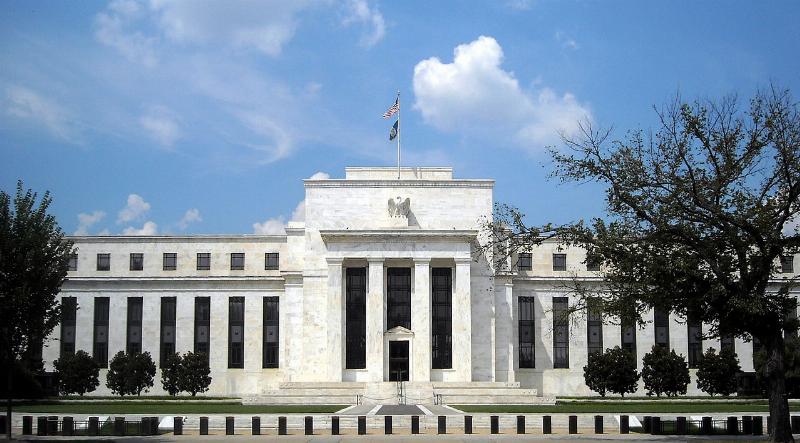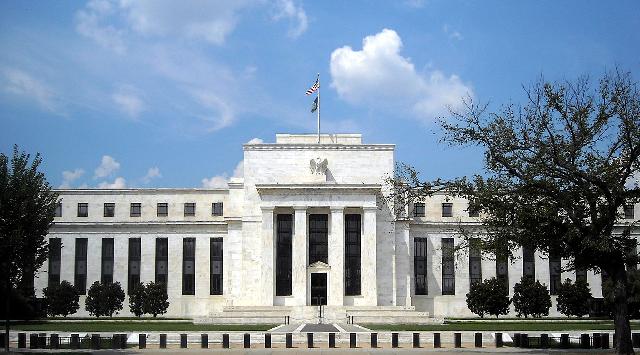


On a recent news opinion broadcast, Victor Davis Hanson, a classicist and social commentator from Stanford University and California State University, stated that we are now in a “counter revolution.” If his observation has merit, it would necessarily require a revolution in the first place. Dr. Hanson never identified what this originating event was, but a case can be made that it is the Revolution of 1913.
The Revolution of 1913?
Yes; a quiet revolution—a revolution that seeped into the fabric and institutions of American society and governance structures in originally such small doses and wrapped into acceptable ideas that no one noticed then, and few notice now. And yet, it is this Revolution that, over time and with persistent adherents, intellectually hollowed out founding governance concepts and is what we are just now “countering” vigorously.

Federal Reserve Headquarters, by AgnosticPreachersKid. CC BY-SA 3.0.
What is your evidence of a Revolution of 1913 in America?
Let’s set the historical stage. By 1900, America was a wealthy nation. We had begun as an agricultural exporter of rice, tobacco, and then, after 1800, cotton. We embraced the mercantile and then industrial revolution with vigor and invention under the auspices of an economic system brought to us, in part, by Adam Smith. After the Civil War, the tycoons of the North controlled the economics of the nation.
We, as a nation, were restless. Teddy Roosevelt represented this restlessness perfectly, talking President McKinley into the Spanish-American War for the sake of our “manhood”, and setting about conquering another nation—the Philippines—and secretly promoting another—Japan—over a long-time ally, Korea. Conquering, waterboarding, mass graves, and secret treaties—all of these would have been opposed by the Founders and out of sync with our constitutional system and moral core.
In addition, America had fought the tentacles of the international banking cartel (a small group of banking families)—known as central banking—from 1812 until 1913, relying on state banks and larger national banks to service an expanding nation’s financial needs. Lincoln was worried the banking cartel was funding the Confederates and would finance the breakup of the United States.
The cartel became wealthy by funding all sides of war and then making loans to nations, paid back through taxes, to create a peace. America wanted no part of it, though a few important American families joined the scheme. Unfortunately, Teddy decided to run for a third term, split the Republican vote, and allowed Woodrow Wilson to become President of the United States. Wilson was not a fan of the Constitution of the United States, so he proceeded to implement the Revolution of 1913, with the help of a small group of intellectuals as well as some prominent business leaders.
America succumbed to the banking cartel by creating the Federal Reserve, a major component of the Revolution.
Congress passed the Federal Reserve Act, allowing this quasi-American institution to exist without audit as an “independent” and special agency of the federal government. It sets our monetary policy through a Board made up of representatives of Regional Federal Reserve Banks (banks and holding companies owned by other nations), prints our currency for a fee, and monitors and controls the amounts of capital available in our economic system by tightening and loosening interest rates. Its decisions may or may not be in the best interests of the United States.
In any regard, the Federal Reserve has never been audited. Many scholars feel the positions taken by the Federal Reserve caused the Great Depression. WWI is thought to have been encouraged and prolonged by the international banking cartel to protect loans to the Allies by influential American financiers. America’s entry into WWI is thought to have been promoted for this reason. All of this information is available to the serious and the thoughtful. Much of this history, however, has been obfuscated from the public. What we do know is:
America has continuously been at war since 1913, for the benefit of the international banking cartel
America is bankrupt
The Great Depression was completely unnecessary
The wealth in gold by individual Americans was confiscated in 1933 with the support of the Federal Reserve
The Federal Reserve cannot be audited by law, and no Congress has changed the law in 112 years
The counter revolution Victor Davis Hanson was talking about involves returning to our original founding constitutional system, including a complete audit and reconsideration of our foray into central banking and its aftereffects; understanding the reasons America fell in love with and supported the ideology of Karl Marx in its many forms; and relearning what constitutes our Rule of Law and the founding philosophies that undergird our original governance system and Moral Law.
It has been over a century since America rejected its Founding system. The Founders themselves knew some of the pitfalls we would face to keep it. To reclaim it, we must first understand clearly how it was lost and what must be done to retrieve its essence now.
